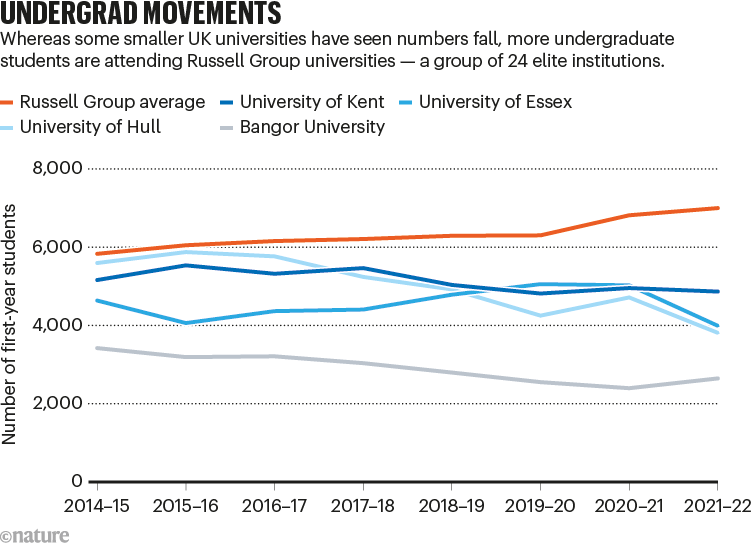Universities are not just businesses, but an investment in future generations
UK university departments on the brink as higher-education funding crisis deepens

This week, when students brush their teeth, pack their bags and walk down Cottingham Road to reach the University of Hull’s chemistry building, it will be with more than the usual sense of trepidation that often accompanies the first day of lectures.
Staff members at the UK university, founded in 1927 in what was then a thriving industrial city, were told about the planned closure of its chemistry department in June. With a dwindling number of undergraduate students, the institution said the annual charge of £9,250 (US$12,000) per student was too meagre to pay for the costs of running the section. The consultation process over the closure is likely to end in the second week of October.
“I was just getting excited and getting a plan together of what I wanted to do in my project,” says Frances Longbottom, a second-year PhD student in the department. “Now it’s all uncertain.”
Because of a heady mix of economic circumstances, 70 of the nearly 290 higher-education providers in the United Kingdom have announced proposed restructures or redundancies, according to data collected by the University and College Union, which represents academic staff.
The UK Labour Party, elected to government in July, was immediately told that a university going bankrupt would be one of a handful of early crises it would face. This warning featured in a list of six possible disasters drawn up in May by Sue Gray, Prime Minister Keir Starmer’s chief of staff. “I think the government has to be planning for a university going bust,” says Julie Tam, an economist and policy adviser at Universities UK, a London-based advocacy group. “That’s got to be something that they are thinking about.”
Higher education is an important industry in the United Kingdom. Many universities, some dating back centuries, rank among the best in the world. The sector provides around 315,000 jobs, including 150,000 in academia. It also contributed £265 billion to the country’s economy in the 2021–22 academic year — around 8.6% of gross domestic product (see go.nature.com/47c8b3h). Universities are among the largest employers in many towns and cities. The University of Hull, for example, generates an estimated 9,260 jobs in the Humber region, teaches 12,490 full-time students and contributes £694 million to the economy in one of the most deprived parts of the United Kingdom.
“Somebody once said, ‘The way to have a great city is to build a university then wait 200 years,’” says Nick Hillman, who runs the Higher Education Policy Institute, a think tank in Oxford, UK. “Hull is a much better place because it’s got a university than it would be if it hadn’t. In terms of supplying workers to local businesses, in terms of regeneration, in terms of bringing income into the town.”
A single university going under is a serious regional issue, but many warn that if one or two declare bankruptcy — and 40% are expected to lose money this year — this could precipitate a bigger crisis. “I’m worried about a domino effect,” Hillman says. “Once one university falls over, some lenders are going to think ‘don’t we lend money to the university sector?’, start looking at their books and then pull the plug on their loans.”
Policy changes
Government policies can be blamed for much of the financial mess. The United Kingdom caps tuition fees — limiting what universities can charge British students, who usually use a low-interest state loan paid back over decades. In 2012, the government controversially raised the cap from £3,000 to £9,000 a year. It rose to £9,250 in 2017.
Inflationary pressures took their toll. “We saw years of plenty at the beginning, followed by gradual years of drift,” says Hillman. “And once inflation hit 10% [in July 2022] then it was more than a drift: it was a really significant cut.”
A cap on student numbers was removed in 2014, further squeezing some middle-sized universities. Now, institutions can accept as many undergraduates as they like.

Why we quit: how ‘toxic management’ and pandemic pressures fuelled disillusionment in higher education
This has caused “the middle part of the sector to really suffer”, says Tam, “because some top institutions have a massive draw to students”, particularly those in London and other large metropolitan areas. Smaller universities in less attractive destinations saw the number of first-year students drop. At Hull, the number of first-year undergraduate students in its chemistry programme has fallen from more than 160 students in 2012 to fewer than 20 in 2023, according to data seen by Nature.
Attracting international students can offset funding shortfalls, and the government doesn’t limit what institutions can charge those students. But they, too, are rare on some campuses, because of increased competition from abroad and what many perceive as a hostile attitude to immigration after the United Kingdom’s formal exit from the European Union in 2020, says Shahenda Suliman, head of higher education at the University and College Union in London.
Some UK universities planned to address a fall in European students after Brexit by attracting researchers from low- and middle-income countries, such as India and Nigeria. The number of Indian students increased fivefold between 2017 and 2021, and that of Nigerian students tripled.
But students from those countries were more likely to bring dependants with them and, after a rapid rise in immigration figures, a law change in January now prevents them from doing so. The number of visas granted to Indian students fell by 23% and to Nigerian students by almost half between July 2023 and June 2024, compared with the same period the year before.
“There’s quite a lot of policies that have really converged right now, and as a trade union, we have significant concerns about the impact that that’s had on academic staff,” says Suliman.
Management confidence
Larger universities in major cities have attracted more undergraduates, leaving smaller institutions to compete for a shrinking pool of students (see ‘Undergrad movements’). But some have bucked the trend.

Source: HESA
The University of Essex in Colchester warned its staff in March about the risk of a £14 million shortfall in income. Tom Cameron, a professor of applied ecology there, lists the protective measures the institution has brought in. “We put a halt to promotions, we put a halt to bonus payments. And we put a halt to a lot of external recruitment for certain positions. All of these things may be frustrating, but, collectively, it means that you and your colleagues have jobs. I view that very positively,” he says.
Other academics are more critical of how senior leadership at their institutions has handled the economic circumstances. “For a long time, I have been generally unhappy with the university management,” says evolutionary anthropologist Brandon Wheeler, who was made redundant by the University of Kent in Canterbury last month.
In March, Kent announced an expected operating-budget shortfall of £31 million, following a £12 million loss in 2023, and said it had rescheduled its debt repayments, with the next repayment arranged for March 2026.

We can make the UK a science superpower — with a radical political manifesto
Wheeler, who is now at the University of Roehampton, London, says that Kent has wavered for years between cutting the anthropology programme entirely and letting it continue. “Confidence in university management is something that’s been completely lacking both from academic- and professional-services staff at Kent,” he adds.
A University of Kent spokesperson says: “Like many in the sector, we face a number of financial challenges, including the fixed tuition fee, high inflation and changes in student behaviour. Our 2022–23 accounts reflected this, although we have put into action plans to address this and have improved our budget forecast for 2023–24 since initial cautious projections earlier in the year.” The university is already phasing out some courses on the basis of expected student demand, but will continue to offer a mix of subjects across science, technology, engineering and mathematics disciplines, the spokesperson adds.
Hull, Kent and Essex universities are not the only UK higher-education institutions facing financial difficulties. Alexandra Thomas was a first-year chemistry student in December 2018 when Bangor University announced that its chemistry department was closing as part of an effort to save £5 million. Staff members and students were told the university would teach the remaining students until the end of their courses. Thomas, who is now a PhD student at the University of Nottingham, says: “The downside with that was once the closure was scheduled for 2022, a lot of people started leaving. People from my cohort left to go to different universities. And year after year more academics left for different jobs. So it got increasingly harder the more you got towards the end.”
But Thomas also lists advantages as student numbers dwindled. “The fact that it was so close knit meant that you did get the best out of your degree,” she says. “I speak to people who had 300-plus people in their degree. Trying to ask a question or to get the lecturer’s attention just didn’t happen. With such a close-knit cohort you had that help right there.”
Bangor University declined to comment.
In a letter sent to undergraduate chemistry students on 7 August, the dean of the Faculty of Science and Engineering at the University of Hull, Dirk Schaefer, said that one proposal was to stop offering chemistry courses “from the academic year 2025–26”. Further letters from David Petley, Hull’s vice-chancellor, say the university needs to save £23 million over two years across its departments. Nature understands that one option under consideration is to stop all chemistry courses at the end of July 2025 entirely and offer to transfer students, “perhaps with compensation”.
An anonymous staff member at Hull says that, as recently as last year, chemistry staff were told that the department was valued and the university did not intend to make anyone redundant. “I feel sorry for the students,” the person adds. “They have their lives ahead of them and they’re in danger of not getting the product they signed up for, in the place that they chose.”

Frances Longbottom is a PhD student in the chemistry department at the University of Hull, UK.Credit: Frances Longbottom
A Hull spokesperson says that plans to close the department are merely “under consultation”. They add, “In common with most universities, we are not exempt from the challenges faced by the higher-education sector. These include a significant reduction in international-student applications and changes in UK student recruitment and application patterns, which have led to a drop in income whilst other costs continue to rise.”
For chemistry, the university notes it has tried unsuccessfully to put the department on a more sustainable footing over a number of years, despite its strong reputation and league table position. “We are, however, proposing to continue teaching chemistry where it forms part of other programmes, for example chemical engineering, biochemistry and medicine,” the spokesperson concludes. (The university’s medical degree is offered jointly with the nearby University of York.)
Blame game
Cameron highlights the importance of decisive university leaders at such testing times. “That leadership must decide where to invest and where to cut or merge departments to ensure the future of institutions. And those in charge might not necessarily be trained or prepared to run an organization of thousands of staff and students.” Wheeler questions whether many university leadership teams have the appropriate skills to streamline departments. “If you are going to run the university like a business, you should have people who know how to run businesses,” he says. “Not people that have a PhD in biosciences, or nursing, or sport science or whatever. Those are not the people who are qualified to do that.”

UK election: scientists welcome Labour’s landslide win
Many feel that universities should not be run as competitive businesses at all. “To me, it just kind of comes down to ‘What is a university?’,” says Wheeler. “Is a university something that’s there to make profit, and do we only offer courses of study that are profitable, or is there a value to courses of study for subjects that benefit society as a whole and should be subsidized?”
“I don’t like talking about this,” says Cameron. “I didn’t go into academia for money; I’m not doing my job because I get more salary. We’re forced to talk about students like commodities because of the system that society has chosen for us.” But he does acknowledge that there are potential efficiency gains to be made. “We have so many universities within 50–100 miles of each other, especially in England. Employment is important but I think efficiency is important as well. I think there probably is room for efficiency across the sector.”
Hillman argues that it’s reasonable for universities to close departments that are less popular and aren’t serving students. “There have been one or two rows about institutions closing language departments, for example, or politics departments and history departments. We don’t want our universities to be never-changing,” he says. “It’s reasonable that universities could close departments, just as it’s reasonable they should open things up. They’re running AI courses now, which they wouldn’t have been running 10 years ago.”
Crisis management
In July, the Office for Students — which regulates higher education in England — tendered a contract for financial-management consultancy firms to take over universities that become insolvent. The document specifies that at-risk higher-education providers should be evaluated to “ensure that the interests of students are safeguarded throughout any financial adjustments or transition, including potential market exits”. The previous month, UK education secretary Bridget Phillipson told BBC Radio 4’s current-affairs programme Today that universities should not expect a bailout from the taxpayer if they are facing bankruptcy, although she added that universities were a “public good”, and that she would seek to protect them and help them to attract international students.
Hillman remains sceptical that the government would allow an institute to go under. “My view is whatever politicians might have said in the recent past, you can’t really let a large multi-faculty university just fold, because they’re too important to the local region,” he says.

UK academics seethe over universities’ cost-cutting moves
“If there isn’t a solution, we’re going to see a lot of these institutions contract, so we are already talking about thousands of jobs lost,” says Suliman.
Tam says that the crisis is so acute that the sector needs immediate government attention, and suggests that one simple step might be to allow student fees to rise above the £9,250 limit. But she acknowledges that this would be politically “unpalatable” for a government chasing young people’s votes. A long-term funding framework would also help. If the government could commit to a 10-year plan, that “will help businesses invest more in research”, she says. Reversing some of the damaging policies that have made the market more competitive might be helpful, too. Restoring the cap on enrolment numbers, says Wheeler, might create more demand for universities that are struggling to recruit.
Hillman suggests that a more radical step could be to sell a university to a foreign power. “The single most valuable thing a British university has is the right to award British degrees. Because having a British degree is very valuable; that’s why international students are paying for it. So if a university falls over and the government’s got no spare money and it just wants the problem to go away, would it sell a British university?” Hillman says that there is no process in place to arrange this, “but there’s a lot of money abroad that would happily purchase an institute with degree-awarding powers”.
Whatever comes next, the next term will be a difficult one in Hull. “It would be heartbreaking to leave. And it’s such a massive worry — the unknown, and losing something that’s so important to a lot of people,” says Longbottom. “Chemistry at Hull has a really good reputation, but if it closes, that reputation will go. It will fade away.”
Related
Llyods Recruiting Engineers In India After Slashing Jobs In UK
Lloyds Banking Group is planning to hire hundreds of engineers in India as the company plans to shift its employment opportunit
Major new funding for music acts that supercharged careers of…
£1.6m Music Export Growth Scheme to support 58 independent UK artists to tour the world Funding will boost UK’s creative industries – a key growth se
Well-loved restaurant chain to close 8 venues across UK as…
A BELOVED restaurant chain has announced it will close eight venues across the UK, scrapping 158 jobs in the process.Owners are pointing the finger at Labour's
US adds 151,000 jobs in February as unemployment rate ticks…
The latest figures published by the US Bureau of Labor Statistics today (7 March) came in below market expectations, with economists polled by












